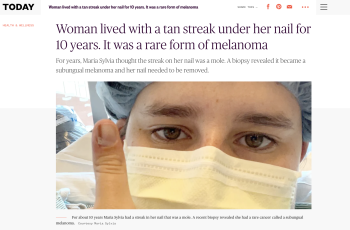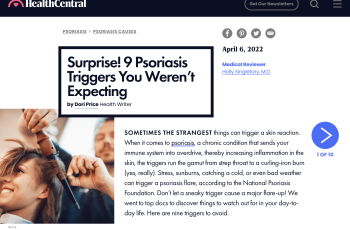News Archive
For a decade, Maria Sylvia had a tan streak on her nail. Doctors told her it was a mole and nothing to worry about. After a colleague urged her to get it examined again, Sylvia learned it was a rare skin cancer, called subungual melanoma, and shared her experience on TikTok.
Sometimes the strangest things can trigger a skin reaction. When it comes to psoriasis, a chronic condition that sends your immune system into overdrive, thereby increasing inflammation in the skin, the triggers run the gamut from strep throat to a curling-iron burn (yes, really).
Practical Dermatology® magazine is proud to announce that Vishal Anil Patel, MD will serve as interim editor of our Digital Practice column.
In this video interview, Adam J. Friedman, MD, FAAD, gives the highlights from his presentation at the 2022 American Academy of Dermatology annual meeting about dietary triggers in acne, providing evidence, and discussing how the idea came to be.
Night blindness, which occurs when people have trouble seeing in dim light, can have many causes – but also many solutions. Keith Wroblewski, MD, associate professor of ophthalmology at the George Washington University Medical Faculty Associates, takes us through the whys of night blindness and…
At the American Academy of Dermatology’s 2022 Annual Meeting in March, board-certified dermatologist Adam Friedman, MD, FAAD, professor and chair of the Department of Dermatology at the George Washington University School of Medicine and Health Sciences, received a Presidential Citation Award.…
Researchers at the George Washington University published findings from the world’s largest cohort study showing that hospitalized patients with moderate COVID-19 who were given aspirin early on in their treatment had a lower risk of dying compared to patients who were not given aspirin.
There are many factors that can keep a person at their job: an excellent employer, a great mission, or wonderful coworkers. For Pearl Williams, a registered medical assistant at the George Washington University Medical Faculty Associates, it’s the people.
As TikTok has become one of the most widely used social media platforms, millions of mostly teenagers regularly log on for skin care advice, which, more often than not, comes from "skinfluencers," aestheticians, and others who are not dermatologists.
The George Washington University (GW) School of Medicine and Health Sciences (SMHS) and the GW Medical Faculty Associates (GW MFA) are pleased to announce the appointment of Robert Sterling, MD, FAAOS, FAOA, as the new chair of GW’s Department of Orthopaedic Surgery. In this role, Sterling will…









